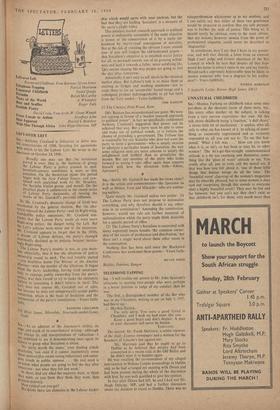an admirer of the Spectator's virility, its e oge, and much
of its contributors' writing—although hm always its odd interpretations of radicalism—I .ani saddened to see it demonstrating once again its failure to grasp what Socialism is about. .N0 party worth the name,' your leading article Proclaims 'can exist if it cannot instinctively sense these motives [for recent voting behaviour] and antici- Pate trends in public opinion . . . the real need is t c) know what people are going to feel the day after tomorrow. : not what they felt last week.' ,„ In short, find out what the majority want, or think they want, or you think they think they want, then Promise delivery.
How cynical can you get?
No doubt there are elements in the Labour leader- ship which would agree with your analysis, but the fact that they arc leading 'Socialists' is a measure of the party's plight today. This intuitive market research approach to political power is undeniably acceptable if the main objective is power or the conservation of it by a party un- hindered by 'starry-eyed' conceptions of morality. But at the risk of restating the obvious I must remind you—if you will forgive the old-fashioned jargon— that Socialism's objective is to establish social justice for all, to persuade society out of its growing selfish- ness and lead it towards a fuller, more satisfying life. T,his means shaping the way people are going to feel the day after tomorrow.
Admittedly it isn't easy to sell ideals in the electoral market place. But Labour's task is to make them as exciting as fridges and washing machines—not to trade them in for an 'acceptable' brand image and a redesigned product indistinguishable in all but label front the Tory model.—Yours faithfully,
[Mr. Baistow has misunderstood our point. We were not arguing in favour of a 'market research approach to political power': in fact we specifically condemned Anthony Crosland's suggestion that power can be achieved that way. But a party must be able to sense and make use of political trends, or it forfeits the chance of providing a government. The Tribune line is reasonable for any Socialist who does not want the party to form a government—who is simply anxious to advocate a particular brand of Socialism, the way some religious sects are more anxious to satisfy the enlightened and faithful than to proselytise the masses. But any member of the party who looks forward to seeing it take office again must concern himself with how the electorate feels.—Editor, Spectator.]


































 Previous page
Previous page